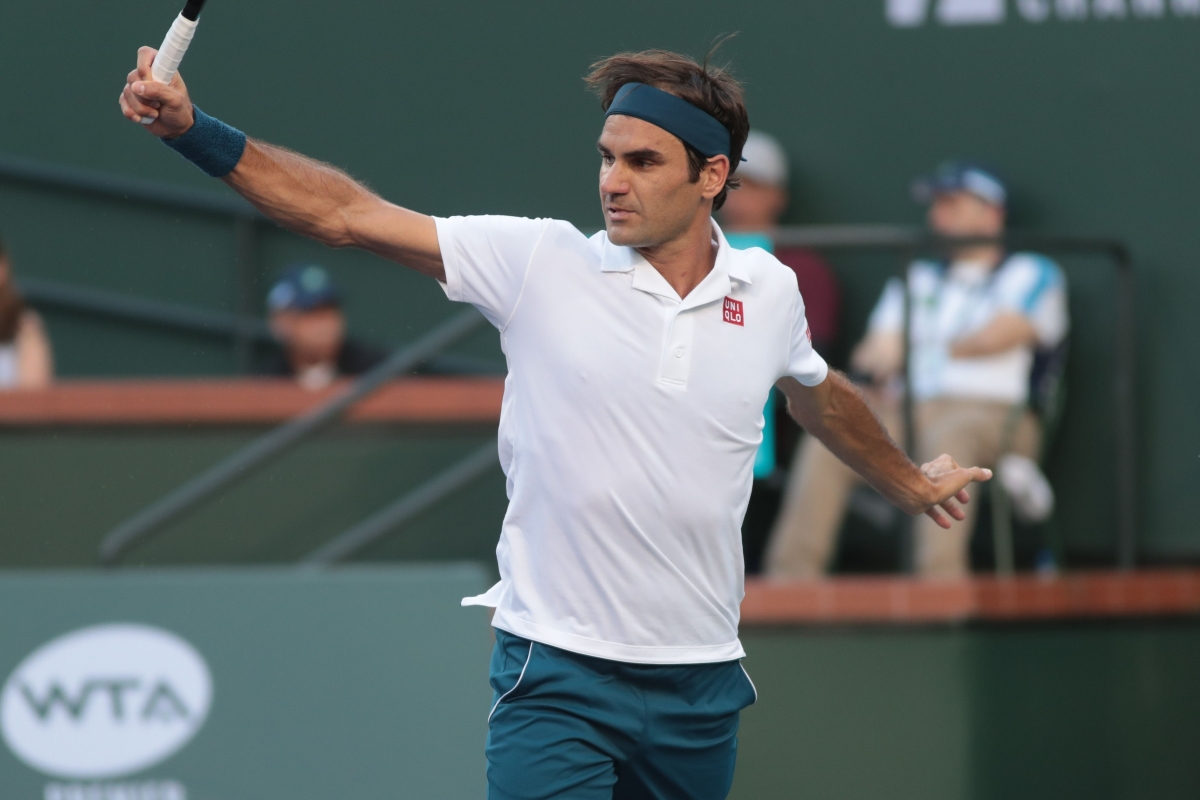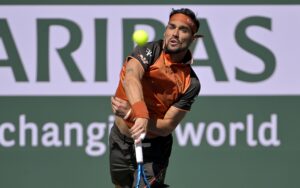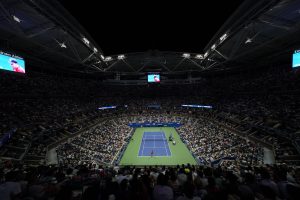As it approaches its 2023 final this weekend, the ATP Rotterdam Open is also celebrating its fiftieth edition. It should actually be celebrating its 51st edition, because the tournament was first held in 1972. However, the following year it was not staged at all because of a scheduling clash, as tennis, which had only been fully professionalised four years earlier, struggled to establish a reliable global calendar.
That is somehow in keeping with what in many ways is a wonderfully idiosyncratic event, which effectively marks the second start to the tennis season, at least in Europe, after the Australian Open and the warm-up events leading up to it. Rotterdam has been won by a succession of great champions (including arguably the greatest of them all) as well as the finest Dutch players, and it has even had a final completely cancelled because of a bomb scare.
Here, in chronological order, are five famous finals from the first half-century (give or take a year or two) of the ATP Rotterdam Open.
ATP Rotterdam Open: Five Famous Finals
1972: The First Final (Arthur Ashe beats Tom Okker 3–6, 6–2, 6–1)
Even today, more than fifty years later, Arthur Ashe remains the joint most successful player at the Rotterdam Open, alongside Roger Federer (and there will be more on Federer in Rotterdam later). Both Ashe and Federer won three times in the great Dutch seaport and Ashe won the first of his hat-trick of titles in the 1970s in the very first iteration of the tournament.
Ashe’s opponent in that inaugural Rotterdam final was the first great Dutch male player, Tom Okker. Like Ashe, Okker had begun his career in the amateur era and then transitioned into the Open era from 1968 onwards. However, unlike Ashe, who was a three-time Major Singles Champion (he won every Major except the French Open), Okker never managed to win a Major Singles title. But he did reach at least the semifinal in the Singles at every Major and even made the final of the very first US Open in 1968, where he lost to Ashe 14–12, 5–7, 6–3, 3–6, 6–3, two years before the introduction of the tiebreak.
The first Rotterdam Open final in 1972 was not quite as epic as the 1968 US Open final, but it still went the distance before Ashe prevailed in three sets, defeating “The Flying Dutchman” (as Okker was inevitably known) in front of his adoring home crowd.
1974: A First Home Win (Tom Okker beats Tom Gorman 3–6, 7–6 (7–2), 6–1)
Okker gained revenge of sorts two years later (after the cancellation of the event in 1973 because of the aforementioned scheduling clash) when he defeated another American, Tom Gorman, in “The Battle of The Toms”, as it was called at the time, even in Dutch. Thus, he finally won the biggest tournament in the Netherlands, a status that Rotterdam has retained ever since.
Like Okker, Gorman never won a Major Singles title but he did reach the semi-finals at three of the four Majors (the Australian Open being an exception). Indeed, when he faced Okker in 1974 he was probably at his peak, having reached #8 in the world rankings in 1973. Consequently, this second Rotterdam Open final was a clash of two of the finest male players in the world at the time. The American Tom won the first set comfortably and took the second to a tie-break before his Dutch namesake completely dominated the third set to win the tournament.
1984: The Final Nobody Won (Ivan Lendl v Jimmy Connors, 6-0, 1-0, before the Final was abandoned)
The 1984 Rotterdam Open final became a permanent feature of any tennis trivial pursuit quiz by becoming the final that neither of the finalists – Ivan Lendl and Jimmy Connors – won. That was because it was suspended early in the second set after a bomb scare and even after the all-clear was given Lendl was so shaken up that he refused to continue. Remarkably, rather than the match and the tournament being automatically awarded to Connors, as would have been the case if Lendl had defaulted or withdrawn through injury, both men were declared runners-up.
Perhaps Connors was too embarrassed to accept the title after being bagelled in the first set and going a game down in the second set. Whatever the reason, the match, incomplete as it was, signalled the different directions in which the two great rivals were trending by the start of 1984.
Ten years earlier, Connors had been a dominant world #1, winning every Major in 1974 except the French Open. Remarkably, he was banned from competing in Paris that year because of his involvement with the mixed-gender World Team Tennis league in the US, which the Roland Garros top brass bizarrely disapproved of. By 1984, however, he was entering the final stages of his legendary career, as evidenced by his humbling experience in the Rotterdam final.
In complete contrast, at the start of 1984 Lendl was very much on the way up. Although he did not actually triumph in Rotterdam, within a few months he would win his first Major in Paris, defeating John McEnroe in one of the all-time great French Open finals, and he would go on to become the most successful male player of the second half of the 1980s. Ironically, both he and Connors would both end up winning eight Majors, finishing their careers all-square in that regard, just as they had finished all-square in Rotterdam in 1984.
1995: The All-Dutch Final (Richard Krajicek beats Paul Haarhuis 7–6 (7–5), 6–4)
For all of its achievements in other sports, notably football, which it completely revolutionised in the 1970s with the invention of “Total Football” (a system in which any outfield player could fill any outfield position), the Netherlands is not one of the powerhouses of tennis. Indeed, it has only ever had two Grand Slam Champions, with Cornelia Bouman winning the Women’s Singles at the 1927 French Open and, nearly 70 years later, Richard Krajicek winning the 1996 Wimbledon Men’s Singles.
A year earlier in 1995, Krajicek had won the Rotterdam Open in the only all-Dutch final in the tournament’s history. His opponent was Paul Haarhuis, who was himself a fine player, reaching the World’s Top 20 in Singles and then becoming world #1 in doubles. In 1995, however, Haarhuis was unable to defeat Krajicek, who took the first set on a tie-break and then closed out the second set 6-4. And Krajicek would win in Rotterdam again in 1997, beating Daniel Vacek of the Czech Republic in that year’s final.
Since the hey-day of Krajicek and Haarhuis in the mid-1990s, Dutch tennis has arguably not been as strong again until now. In Botic van de Zandschulp and Tallon Griekspoor, the Netherlands currently has two extremely accomplished players.
Van de Zandschulp has been inside the World’s Top 25 and Griekspoor inside the World’s Top 50, and together they helped the Netherlands to defeat Great Britain in the Davis Cup qualifiers last September. Furthermore, there will definitely be at least one Dutch player in the semi-finals in Rotterdam this weekend, because Griekspoor faces yet another Dutch player, Gijs Brouwer, in one of the 2023 quarter-finals.
2018: Roger Federer’s Final Triumph? (Federer beats Grigor Dimitrov 6-2, 6-2)
Six months on from his retirement, tennis is still coming to terms with the retirement of Roger Federer, the sport’s most popular player ever and aesthetically its greatest player ever. In truth, though, Federer’s retirement had been a long time coming, because from the start of 2020 onwards he had struggled with a succession of injuries that eventually ended his career.
Five years on from Federer’s 2018 Rotterdam Open triumph, it is possible to regard it as the final, crowning glory at the end of a truly glorious career. The previous month, he had won his 20th Major, the Australian Open, and when he won again in Rotterdam, easily beating Grigor Dimitrov (who was nicknamed “Baby Fed” early on in his career because of the resemblance of his playing style to Federer’s) he not only returned to the world #1 spot after a gap of five years but became the oldest ever world #1 at that point. In retrospect, it was probably the last time that Federer was at his absolute peak. Consequently, just as Bogart and Bergman in Casablanca “will always have Paris”, FedHeds the world over will always have Rotterdam.
Main photo credit: Zoe Meyers/The Desert Sun





